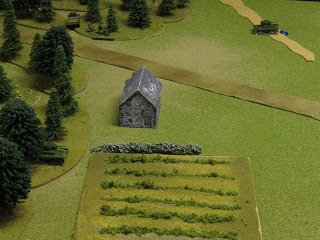“Hey, I remember when we used to play WWII games with Mike.” So, when he’s in town over the holidays, I make an effort to do it again.
For the most part when we play WWII, we play skirmish scale games: individually based infantry and about a platoon on each side. We also play infrequently, so we seem to have settled on the Disposable Heroes ruleset. It’s easy to relearn for only one game per year, and it lacks most of the quirks we found in rules like BAPS.
For WWII, I prefer to play scenario games instead of point-based pickup games, so I’ve invested in a bunch of the Skirmish Campaigns scenario books. They provide a lot of balanced scenarios with different sized forces and boards, with a credible but not overwhelming amount of research in support.
 |
| Russian tanks threaten the barn as Germans advance from the right |
This year we played Counter-Attack at Bereza, a scenario from Russia ’41 – Drive on Minsk. Mike played the Russian force, and Frank and Andy were German. I ran this as a single-blind game. Both sides moved their forces on a map, and I made spotting checks. When units were visible, they were placed on the board for all to see. This slows down the game significantly, but adds a lot: when you don’t know where the enemy is or what their objective is, you have to expect the unexpected. It’s dangerous to move around not knowing where the enemy is, but you need to be aggressive in order to take your objectives.
In this case, both sides had the same objective: to take and hold the two buildings on the map. Germans started off board and approached from one side, and the Russians started on the other end of the map but on the board. No one held the buildings initially, but they were closer to the Russian side. However, the Germans didn’t know where the Russians started, so they didn’t know whether they’d need to assault the building or just walk in unopposed.
 |
| Russians hold the house and threaten the German advance |
Both sides had only 2 squads of infantry to take and hold the buildings, and 5 tanks or antitank guns. The tanks were all comparable: early war lightly armed and armored. There seemed to be two main forces at play here. The infantry had no anti-tank capability, but they were valuable to help spot the tanks before they were placed on the board. Tanks also have a hard time shooting infantry in this game, but they can be deadly if they can acquire a target. Achieving armor superiority was important to save the limited infantry for the buildings.
In the first half of the game, the Russians were in a better tactical position, but lost a few tanks. They still had a good crossfire set up, and were in cover, so they regained armor advantage before the end of the game as the Germans advanced in the open.
On the infantry side of things, the barn in the center was the first contentious point as expected. Mike’s Russians made a mad dash for the building with a heavily damaged squad, right in front of Frank’s German rifle section. He made it into cover, but the Germans drove him off in close combat shortly after.
With Frank’s other section basically gone, this left Andy’s squad to take the second building. Mike moved into the house with a Russian tank crew, and then reinforced it with his squad of ninjas who made it almost to the last turn of the game before being spotted. Andy’s infantry took heavy fire, and at this point it became clear that we had a standoff.
Although the Russians were in a stronger defensive position, the Germans had advanced past the barn. Neither side had infantry close enough to their second objective to reach it in the two turns remaining in the scenario. We could have fought a battle of attrition to the very end, but this was only a small part of a very wide front, so it would’ve been as pointless as most real wars are, and no more fun. We called it a draw and moved on.
Some gamers who play nothing but DBA like to complain that “other games” take a really long time, and don’t produce any decisive results. Although this game was a perfect example of that phenomenon, there was no real downside this time since we all get along well. The main point was to hang out and have fun, and we did. I call that a win.
Hopefully Mike can make it out to Pittsburgh more often. I enjoy these games, but I am not likely to put in as much effort as I did more than twice a year, these days.